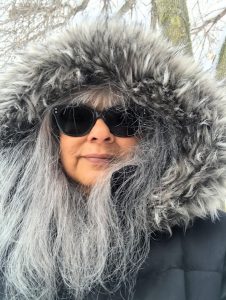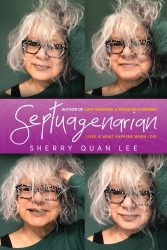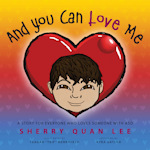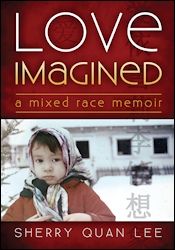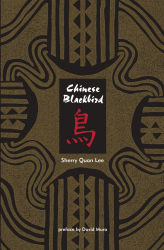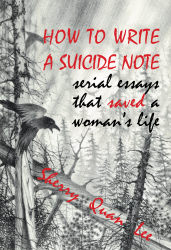SELF-INTERVIEW: SWAN SONG. SEPTUAGENARIAN
- You say your most recent book, Septuagenarian, is your swan song, what do you mean by that?
Septuagenarian is the last book I will write. Friends ask me why and I respond
“I am tired.” My focus has always been to discover who I am and why, while hoping to open up a space for dialoging about identity. I’m ready to engage in larger conversations, conversations one can’t have until we know who we are. That said, I am a one-on-one extrovert, not comfortable engaging in large crowds of public spaces.
Early on in my writing career, I attended many local readings, hoping to support and engage with local writers, especially writers of color; but, in my later years I became more isolated. Maybe it has something to do with age, but mostly I think a change in location, moving away from the Twin Cities, was a detriment. The more isolated I became, the more I became a social recluse. And, although I’ve always been an introvert in larger gatherings and public spaces, the pandemic drew me inward even more. I don’t “Zoom” and I don’t want to (never say never), although I am getting comfortable with viewing the online options which are opportunities to see Twin Cities and national artists who are so generous with their time and talent in the comfort of my condo.
- Of all your books, which do you like the best?
Thanks for asking that question. I actually like best the book I didn’t write, but edited, How Dare We! Write a multicultural creative writing discourse. It was an opportunity to work with twenty-four writers in the mix from across the country and here at home who had stories about their experiences as writers that needed to be told . I also think it gained the most attention of all my books. It is being used in college classrooms and included in Poets and Writers Best Books for Writers.
https://www.pw.org/bestbooks/how_dare_we_write_a_multicultural_creative_writing_discourse)
Also, And You Can Love me a story for everyone who loves someone with ASD is a book close to my heart because it’s based on my observation of and experience with my grandson who was diagnosed with autism at the age of 3 ½.
The process from the beginning was a learning experience. I took a picture book class from Alison McGhee, international known best-selling author, to learn what is involved in picture book writing. I, then, worked with two younger artists who also had no previous experience with picture books.
To see my grandson, now a teenager, page through his book is my greatest reward.
- What have you left out of your most recent book and why?
I can’t stop thinking about what poems I didn’t write. I have to admit that three or four years ago the book started out with just fifteen poems because I was submitting them for a competition-the first year poetry, then prose, then poetry again. Not a winner, I prevailed by, I admit, padding the manuscript with previously published poems, and asking my publisher if he would be interested in my swan song. Which, by the way, became more focused when a discussion about the separation of Black families led to me being asked to write about it, to write about how separation has been prevalent in our/my family.
To answer the question, I keep thinking of things I left out or could have explored in more depth, but mainly I left out the physical (including sexual) aspects of aging. I was able to add two lines into an existing poem, but the topic deserves so much more.
- If you could have chosen a different career, other than writer, what would that have been?
That’s an intriguing question. I seldom think of myself as “writer” as a career. Writing and teaching writing were accidents of a sort. I was working for an independent study program where men and, particularly, women were studying for graduate degrees while being in the work force full time and many raising families. I wondered if I could do it. I quit my job before knowing if I had been admitted to a graduate program, not thinking forward much at all.
I wanted a graduate degree just to prove to myself I was smart enough to earn one. I chose writing because that’s the only program I thought I was qualified for even though I wasn’t. Despite, apparently, hesitancy on the Committee’s part, I was admitted and the rest of the story is too lengthy to divulge here.
After graduation a series of community connections provided opportunities to teach, and in 2005 a special connection with a friend led me to my publisher, Loving Healing Modern History Press, who has been loyal to me, to my writing ever since.
Back to the question. I wanted to be an elementary school teacher, but when I was required to learn the “new math” I dropped out of college, only to return on again off again until I earned a four-year degree twenty years later.
- What will you do now?
Now, at seventy-three, my first priority is to stay healthy, to eat well and exercise. But I will continue to work with other writers, to try to give back the support and encouragement my mentors offered to me. Maybe I will become a more consistent blogger and post future writing to my blog site or FB writer’s page. blog.sherryquanlee
I hope to have an audience for my books, but I have little to no interest in book tours or public appearances. Although, if the Pandemic ever subsides, I would graciously accept opportunities to read at local community sites such as Moon Palace Books or East Side Library.
I think it’s time for me to enjoy life now that I have forgiven myself of previous (and still working on) addictive/compulsive behaviors. To reign in some of my I know I am right pronouncements and listen more intently and less reactively, and to forgive abundantly (except those things I believe aren’t forgivable).
- What disappoints you the most about being a writer?
Instead of disappointment I’d rather concern myself with gratitude, with the ongoing progression of BIOPC writers gaining visibility and recognition. That said, there’s a long way to go, especially when organizations make token efforts to be diverse by including BIPOC writers, but don’t respect their monetary worth; but applause for those who do.
- What is your weakest skill as a writer?
Grammar and punctuation.
- What is your best skill as a writer?
Honesty. Fearlessness; writing despite of/because of fear.
- What have been your biggest road blocks to becoming a writer?
Critics: professors that say “writing about race isn’t trendy.” Lack of professors of color in the academy. Lack of white professors who embrace “teaching moments;” and white professors who might know the needs of students of color, but ignore them.
A lack of self-esteem.
I’m not a disciplined writer. I write reactively. I write when a political or personal event, or a story or a poem, or a movie triggers me to react.
- What advice would you give to other aspiring writers?
Follow your heart, but more importantly follow your gut (and seriously, not just metaphorically). Don’t listen to, or at least ignore the critics who shame—actually, you will ignore them if you are following your heart and your gut. Seek out mentors, not just for the craft of writing, but for inspiration and motivation. I always told my students it’s who you know, but I meant that as a relationship of mutual respect and trust and friendship-not greed.
WRITING EXERCISE
I often asked my students to interview themselves as a creative project. I think it’s a way for aspiring writers to contemplate who they are as writer, what’s important to them as a writer, and where they are on their journey toward their goals.
PREVIOUS INTERVIEWS CAN BE FOUND AT:
https://turtleroad.org/2019/10/03/sherry-quan-lee-daring-to-nurture-untold-stories/
https://www.midwestmixed.com/post/midwest-mixed-community-spotlight-sherry-quan-lee
https://core.ac.uk/download/pdf/76349157.pdf
https://www.authorsden.com/visit/viewarticle.asp?id=41176



